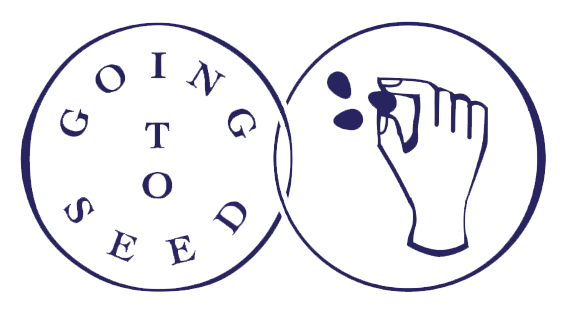Photo: Diana Leal (center) and other participants of a workshop in Richmond hosted by Urban Tilth and Richmond Grows Seed Lending Library
by Julia Dakin
Over the past few months, I had the opportunity to visit four communities in Northern California, where I conducted workshops for many enthusiastic gardeners on growing landraces and seed saving. They were all excited to engage in a collaborative seed-saving and adaptation project tailored to their local environment.
Our partnership with seed libraries and local communities is a significant step Going to Seed is taking to help gardeners and farmers adapt crops to local challenges and extreme weather.
Many gardeners are afraid of saving seeds because they will lose the purity of the heirlooms or hybrids they grow. While heirlooms have historical significance, and hybrids boast specific traits, neither fully addresses the need for adaptive, resilient, and genetically diverse crops in a rapidly changing world. Genetically diverse populations of plants that have evolved through natural selection, traditional farming practices, and human-guided selection over time are essential to the future success of sustainable agriculture. These landrace varieties are intrinsically connected to their specific environments, exhibiting a remarkable ability to withstand local stressors, pests, and diseases. By embracing landrace gardening, we can foster sustainable agriculture that adapts to the unique challenges of each local ecosystem while also preserving the rich cultural heritage associated with these traditional crops.
In each community, the group chose three or more food crops to focus on.
Their goals were to:
- Adapt favorite crops that may not always thrive in that environment. For example, on the cool Mendocino coast, we chose melons, butternut squash and sweet corn to grow as a community. Participants were given starting seeds that had already been pre-adapted to thriving in cool summer environments. They will grow these seeds without greenhouses or row covers, and save seeds from the earliest and healthiest plants. Next year, they’ll focus on saving seeds from the most delicious melons, squash and corn. Each year, seeds contributed back to the project will be more delicious and adapted to the challenges of local conditions. Giving seeds back to the project will ensure there will be plenty of seeds to give to new participants in the future.
- Do the legwork to support their local farmers. The initial couple harvests of an adaptation project can be unpredictable, and people don’t know exactly what they’re going to get. To truly achieve sustainability and seed sovereignty, local farmers will need to be involved. But farmers aren’t in a position to take on risks, so in every case, the group was eager to get the process started to develop reliable, delicious local favorites that could then be grown by farmers in the area. When that happens, communities can take pride in attending farmers markets where the seeds have been selected by members of the community, and flavor preferences will change according to what the community values most.
- Engage long term with the local community of growers. The groups had several ideas on how to do this. One was to organize a local tour of the participating gardeners in the summer. Another was to plan a potluck and tasting party where people bring the results of their harvest and compare tastes. And of course, a seed exchange to bring in gardeners from the wider community will happen yearly in every location.
As I reflect on the progress we've made over the last year, I am filled with immense gratitude for the opportunity to connect with so many passionate individuals and communities. However, I know that our work has only just begun. In order to bring our vision to life and create a more sustainable global food system, we need to reach even more communities and empower them with the knowledge and resources to grow climate-resilient crops and establish seed and food sovereignty.
As we look towards the future, it's crucial to recognize that the challenges we face are not exclusive to gardeners or farmers. These issues touch the lives of every individual, regardless of their connection to agriculture. Our collective efforts to build a sustainable and resilient food system will not only benefit those who work directly with the land, but also ensure the health and well-being of our communities, our ecosystems, and our planet.

